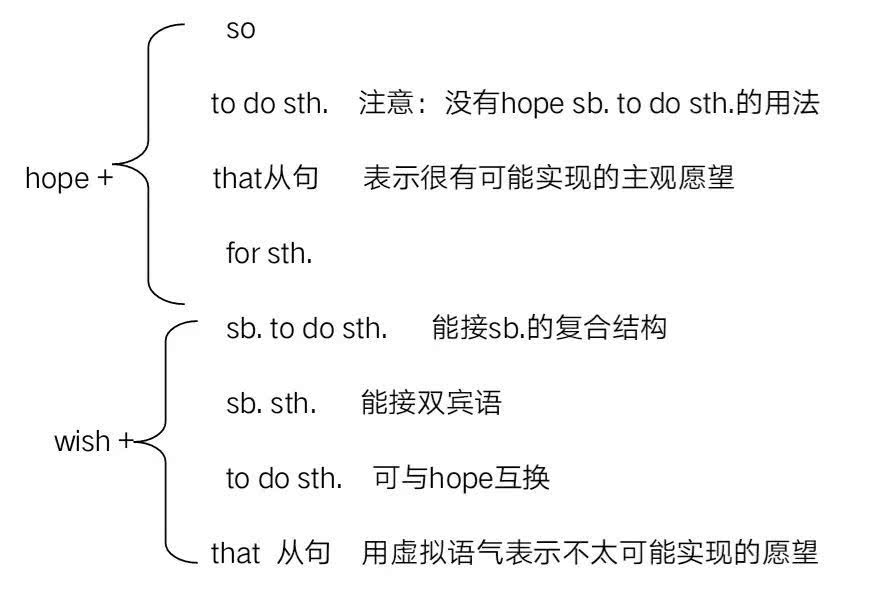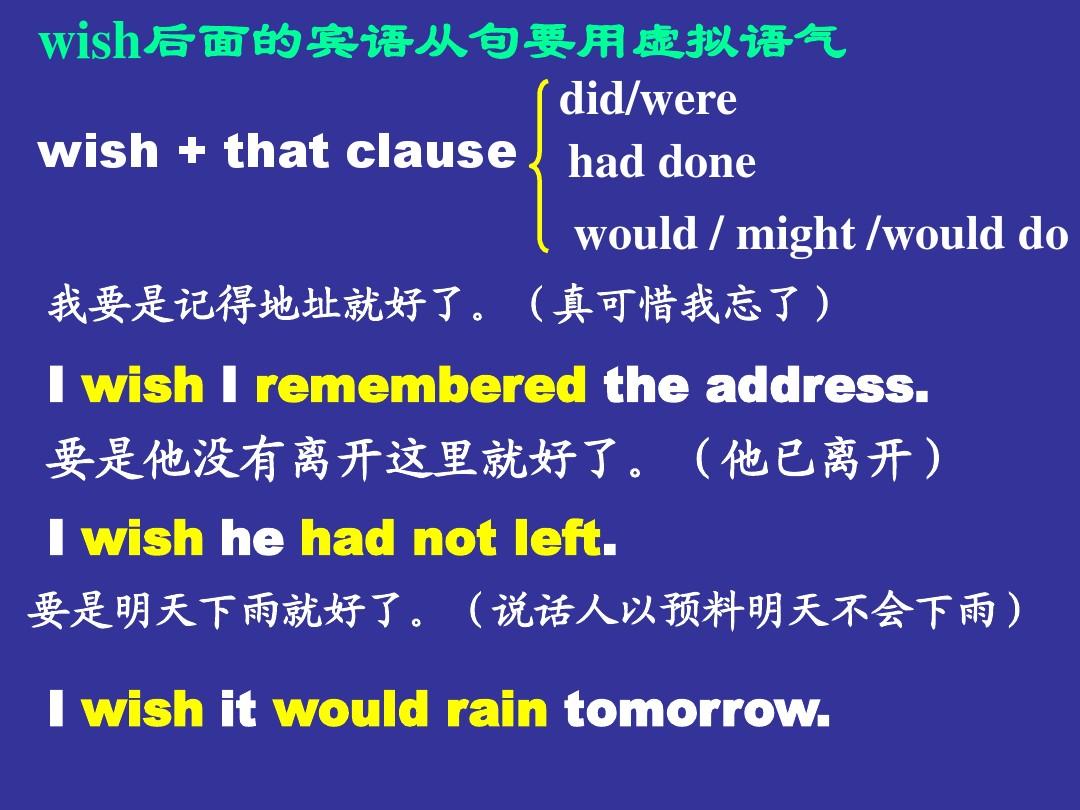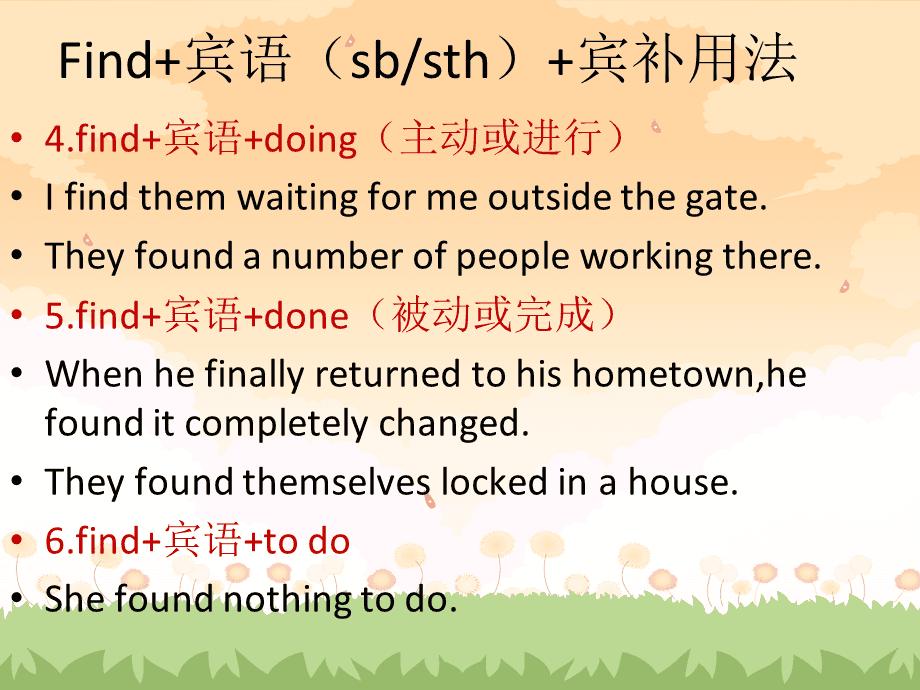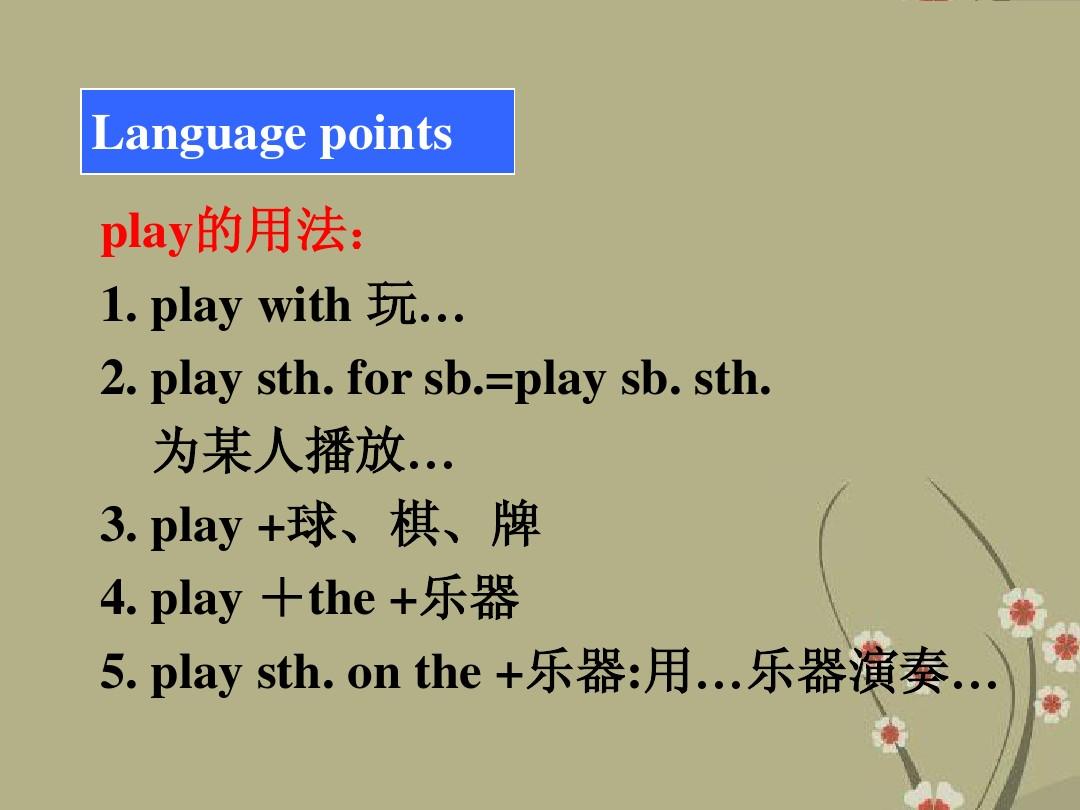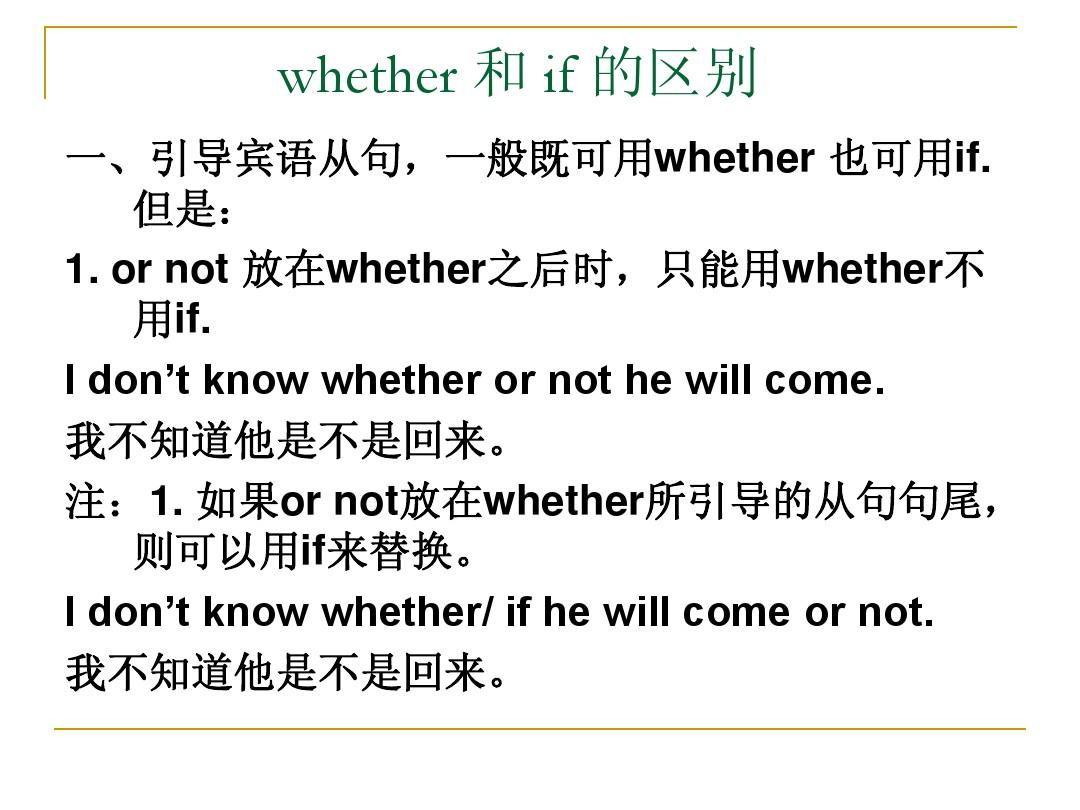宜城教育365速发国际靠谱么_365bet亚洲官方网址_预付365商城下载网www.bjtlcd.com一、英语倒装句12种类型
倒装句:英语最基本的语序是主语在前,谓语动词在后。但有时由于句子结构的需要或表示强调,就要采用倒装形式。
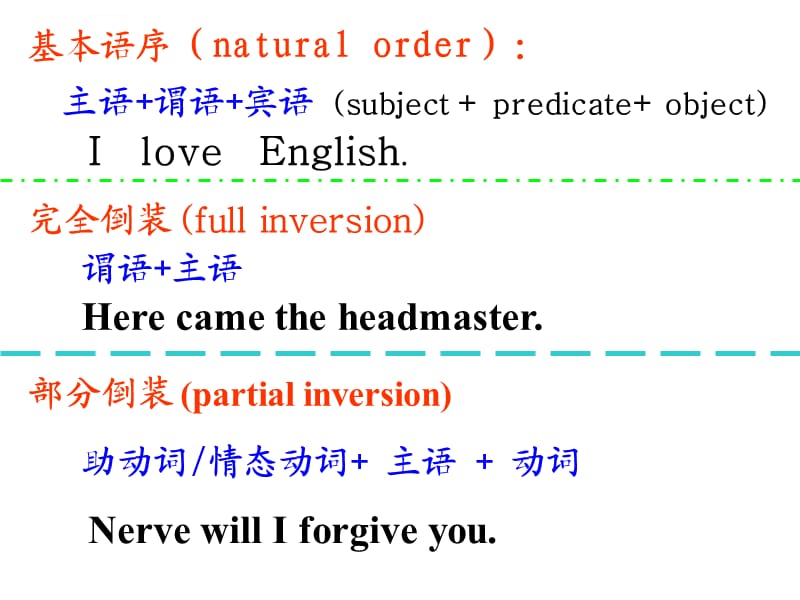
完全倒装
1. 用于 there be 句型.
2. 用于“ here ( there, now, then )+不及物动词+主语”的句型中,或以 in, out, up, down, away 等副词开头的句子里,以表示强调.
注意:
( 1 )主语是代词时,主语和谓语不倒装.
( 2 ) here , there 放在句首通常用一般现在时.
3. 当句首状语为表示地点的介词词组.
4. 表语置于句首时,倒装结构为“表语+连系动词+主语”:
( 1 )形容词+连系动词+主语
Present at the meeting were Mr Li, Mr Wang and many other teachers.
出席会议的有李老师、王老师和其他很多老师.
( 2 )过去分词+连系动词+主语
ne are the days when we used foreign oil.
我们使用洋油的日子一去不复返了.
( 3 )介词短语+ be +主语
Among the ods are books, exercise-books, pens and some other things.
在所有的货物中有书、练习册、钢笔和其他东西.
5. 用于 so, neither , nor 开头的句子,表示重复前句的部分内容.原句的谓语应与前句的谓语的时态、形式相一致.
例如:You can't speak French. Neither can she.
你不会说法语,她也不会.
6. 为了保持句子平衡,或为了强调表语或状语,或是上下文紧密衔接时.
例如: They arrived at a small village, in front of which w a big river.
他们来到一个小村庄,村庄前面是条大河.
部分倒装
1. 否定副词位于句首时的倒装
在正式文体中,never, seldom, rarely, little, hardly, scarcely, no sooner, no longer, nowhere 等含有否定意义的副词若位于句首,则其后要用部分倒装:
I shall never forgive him. / Never shall I forgive him. 我永远不会宽恕他。
He seldom es out for dinner. / Seldom does he out for dinner. 他很少出去吃饭。
She hardly h time to listen to music. / Hardly does she have time to listen to music. 她几乎没时间听音乐。
He little realizes how important this meeting is. / Little does he realize how important this meeting is. 他不甚明白这个会议的重要性。
We had no sooner reached the airport than the plane took off. / No sooner had we reached the airport than the plane took off. 我们刚到机场,飞机就起飞了。
【注意】
(1) 对于not…until句型,当not until…位于句首时,其后的主句要用倒装语序:
He didn’t leave the room until the rain stopped. / Not until the rain stopped did he leave the room. 雨停了之后他才离开这房间。
(2) 某些起副词作用的介词短语,由于含有否定词,若位于句首,其后要用部分倒装:
On no accounts must this switch be touched. 这个开关是绝不能触摸的。
In [Under] no circumstances will I lend money to him.无论如何我也不会再借钱给他了。
但是,in no time(立即,马上)位于句首时,其后无需用倒装语序:
In no time he worked out the problem. 他马上就算出了那道题。
2.“only+状语”位于句首时的倒装
当一个状语受副词only的修饰且置于句首时,其后用部分倒装语序:
Only then did he realize that he w wrong. 到那时他才意识到他错了。
Only in this way are you able to do it well. 你只有用这种方法才能把它做好。
Only when he returned home did he realize what had happened. 当他回到家里时,才知道出了什么事。
3. 在一般疑问句和特殊疑问句中常用倒装句。例如:
Is Lily singing or dancing? 莉莉是在唱歌还是在跳舞?
What does your mother do? 你妈妈是干什么的?
4.在以so开头的句子中,使用倒装句式可以使所表达的意思更趋简洁,其汉语意思为“也”。例如:He can ride a bike, and so can I. 他会骑自行车,我也会。
She saw it, and so did I. 她看见了,我也看见了。
注意:(1)如果前句的谓语动词是实义动词,倒装结构中用助动词do,does或did;如果前句的谓语中含有be动词、助动词或情态动词,倒装结构中则要根据其主语使用相应的动词。例如:
He can do it, and so can I. 他能做到,我也能做到。
He is working hard, and so are we. 他在努力工作,我们也在努力工作。
(2)有时so可以表示对前句内容的进一步肯定,意思相当于“是的;的确如此”,此时不可使用倒装结构。例如:
—They will have a od time this evening. 他们今晚会玩得很愉快。
—So they will. 的确如此。
—It’s fine today, isn’t it? 今天天气不错,是吗?
—Ah, so it is. 啊!的确如此。
5. 在以neither/ nor开头的句子中,常常使用倒装句式,表示“也不”。例如:
Tom didn’t watch TV lt night. Neither/ Nor did I. 汤姆昨晚没看电视,我也没看。
They haven’t been to Australia. Neither/ Nor have I. 他们没去过澳大利亚,我也没去过。
6. 连词引导让步状语从句时,从句需采用倒装结构,这时往往把动词、形容词、名词、副词或分词提到主语之前。结构为:名词(不加冠词)/形容词/副词/动词/分词+ +主语+谓语。例如:
Young he is, he knows a lot. 尽管他很年轻,但是他知道很多。
Surrounded we were by the enemy, we managed to fight our way out. 尽管被敌人包围了,我们还是设法冲了出来。
二、英语倒装句常见的几种类型
1.疑问句和特殊疑问句要倒装
Are you cold?
Does he to school by bike?
注意:若疑问词在句中作主语或主语的定语时,不倒装。
Who is your English teacher?
Whose father is a worker?
2.There be 句型
在There+助动词/情态动词+be+主语+地点/时间的句型中,主语在谓语be动词后面,因此这是倒装。
There w not an underground in Beijing before.
There are not many people who want to read this book..
There will be a bketball match this afternoon.
注意:这种倒装句在There seems/happened/used/lived/came to be等句型中也同样适用。
There came the engineer.
There happened to be a friend of mine in the park.
There once lived an old fisherman in a village by the sea.
3.直接引语的全部或一部分放在句首时,引述动词和它的主语有时装。
“May I come in and take a rest?” ked the pool girl.
“Get out of the room!” shouted the angry woman.
4.以here, there, now, in ,out, up, down, away, then等副词开头的句子中,句子要倒装,以示强调。习惯上,除以then开头的句子用过去时外,其余一般使用现在时。
There es the bell.铃声响了。
There comes the bus! 汽车来了。
Out rushed the children.孩子们冲出来了。
Now comes your turn.现在轮到你了。
Then came a new dficulty.接着有个新难题。
注意:在这种句型中,如果主语是代词时就不倒装。
Here you are.
There he comes.
5. 虚拟条件句的省略与倒装
当引导的虚拟条件从句中含有had, were, should等时,如将省略,则要将had, were, should等移到主语前,构成倒装句:
Had you come yesterday, you would have seen him.
若你昨天来,你就会见到他了。
Should you require anything give me a ring.
如果需要什么,可以给我打电话。
Were it not for your help, I would still be homeless.
要不是你帮助,我会仍然无家可归。
注意:省略后提前的had不一定是助动词:
Had I money, I would buy it. 假若我有钱,我就会买它。 宜城教育365速发国际靠谱么_365bet亚洲官方网址_预付365商城下载网www.bjtlcd.com |









